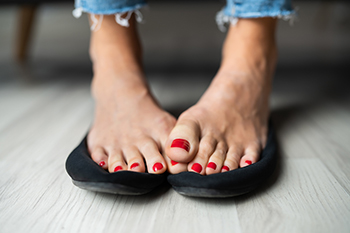
Sweaty feet can be more than just an inconvenience, they can also lead to social embarrassment and discomfort. Medically known as plantar hyperhidrosis, this condition involves excessive sweating of the feet regardless of the temperature or level of physical activity. This occurs due to overactive sweat glands. While it can affect anyone, it is particularly prevalent among teenagers and pregnant women, due to hormonal changes, as well as those who are physically active or stressed. Managing sweaty feet involves maintaining good foot hygiene, such as regular washing and thorough drying of feet. Using antiperspirants specifically designed for feet, wearing socks made from moisture-wicking materials, and choosing shoes made of breathable fabrics can also help control moisture. If these methods do not alleviate the problem, the condition might be considered severe. In such cases, it is suggested that you consult a podiatrist who can provide access to more specialized treatments, such as prescription antiperspirants, iontophoresis, or possibly Botox injections for relief.
If you are suffering from hyperhidrosis contact one of our podiatrists of New Jersey Foot & Ankle Centers. Our doctors can provide the care you need to attend to all of your foot and ankle needs.
Hyperhidrosis of the Feet
Hyperhidrosis is a rare disorder that can cause people to have excessive sweating of their feet. This can usually occur all on its own without rigorous activity involved. People who suffer from hyperhidrosis may also experience sweaty palms.
Although it is said that sweating is a healthy process meant to cool down the body temperature and to maintain a proper internal temperature, hyperhidrosis may prove to be a huge hindrance on a person’s everyday life.
Plantar hyperhidrosis is considered to be the main form of hyperhidrosis. Secondary hyperhidrosis can refer to sweating that occurs in areas other than the feet or hands and armpits. Often this may be a sign of it being related to another medical condition such as menopause, hyperthyroidism and even Parkinson’s disease.
In order to alleviate this condition, it is important to see your doctor so that they may prescribe the necessary medications so that you can begin to live a normal life again. If this is left untreated, it is said that it will persist throughout an individual’s life.
A last resort approach would be surgery, but it is best to speak with your doctor to find out what may be the best treatment for you.
If you have any questions please feel free to contact our office located in Oradell, NJ . We offer the newest diagnostic and treatment technologies for all your foot and ankle needs.
